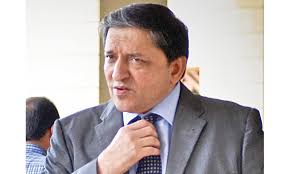The Pakistan People’s Party on Tuesday called for a 25 pc increase in pay and pension, minimum wages of Rs 18,000 pm and a separate fund for the social protection of vulnerable groups, including transgender in the poverty alleviation flagship BISP.
The call was made by Senator Salim Mandviwalla, former finance minister and chairman of the Senate standing committee on finance and revenue while unveiling the party’s shadow budget in a press conference ahead of the national budget due on May 27. PPP’s Parliamentary leader in the National Assembly Syed Navid Qamar, Senator Sherry Rehman, former MNAs Ch Manzoor and Mustafa Khokhar and former Punjab Finance Minister Tanvir Kaira were also present in the press conference.
Mandviwallah also said that President PPP Parliamentarians Asif Zardari had already directed that adequate poverty alleviation measures be spelt out in the manifesto ahead of the 2018 general elections.
At 5.8 trillion, the shadow budget envisages 825 billion rupees in revenue and 4 million new tax filers. It also calls for a restructuring of FBR in order to raise revenues, diverting the resources to enhance social and food security, Mandviwalla said. An additional allocation of 47 billion per year to the health sector is envisaged to bridge the yawning gap in this sector.
A pilot project of health insurance will be introduced in the first stage in Islamabad to serve as a model for the provinces. The provinces will be persuaded to raise education spending to achieve the target of 5 pc of GDP in the next five years.
Sales tax on goods and services and provincial excise will be collected by the respective Provincial Board of Revenue. Federal excise will also be collected by the provincial board of revenue, later transferring it to the federal government on agreed terms, Mandviwalla said, explaining salient features of the shadow budget.
Legislation will be enacted for mandatory sharing of information by all federal and provincial tax agencies, NADRA and law enforcement agencies to document the economy and plug holes in tax recovery, he said.
“Rich becoming richer and poor becoming poorer is a bane of our society,” he said adding that spending which benefitted only the rich will be stopped and diverted to the benefit of the poorest of the poor. Withdrawal of 5 pc federal excise duty on crude petroleum is also envisaged to bring down the cost of transportation for the poor.
The party vowed to build, on priority, the western route agreed upon in the May 2015 APC held at the PM house but conveniently dumped by the government. Special training programs will be devised to initiate business trading with China.
Dilating on it further, Mandviwalla said that CPEC was formally launched during the twilight weeks of the PPP government when the Gwadar Port project was transferred from Singapore to China, in February 2013.
To heal the wounds of the most underdeveloped and militancy-infested areas of Balochistan, KPK and the tribal areas, are the centrepiece of CPEC and the western route of the Corridor, he said.
Zardari has been deeply concerned over the dumping of the western route, insensitivity to the hopes and aspirations of the smaller provinces and the lack of transparency in CPEC’s projects.
The prime minister lectured some 1500 OBOR delegates in Beijing on “transcending differences and resolving conflicts through dialogue to leave behind a legacy of peace”. Just when Nawaz Sharif was making right noises in Beijing, the minister for planning was dismissing indignantly as “factually incorrect” concerns raised in the media back home, Mandviwalla said.
Mandvialla deplored that the National Industrial Policy 2011 aimed at turning Pakistan into “a factory for the world rather than a shop” was not implemented by the government.
“Nawaz Sharif is a businessman and he ought to know that continuity of economic policies must not become a casualty of politics,” he said and vowed to revive the 2011 industrial policy.
To break the vicious cycle of taking loans for repayment of old loans, the PPP proposed involving the private sector in the infrastructural development and a massive reduction in debt-financed investment in infrastructure by the federal government.
Mandviwalla said that the Nawaz government had further pushed the nation into the bottomless pit of debt and debt servicing, leaving nothing for the social sector and development. The overall debt had increased from 9.5 trillion in 2013 to 12.7 trillion rupees in 2016 while external debt rose from 61 billion dollars to 73 billion dollars during the same period. Net public debt exceeded 18.28 trillion rupees – a whopping increase of 35 pc during the PML-N government’s tenure, he said.




